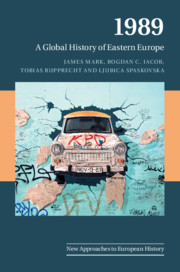31 results
2. - Democratisation
-
- Book:
- 1989
- Published online:
- 29 August 2019
- Print publication:
- 29 August 2019, pp 73-124
-
- Chapter
- Export citation
Acknowledgements
-
- Book:
- 1989
- Published online:
- 29 August 2019
- Print publication:
- 29 August 2019, pp vii-viii
-
- Chapter
- Export citation

1989
- A Global History of Eastern Europe
-
- Published online:
- 29 August 2019
- Print publication:
- 29 August 2019
Introduction
-
- Book:
- 1989
- Published online:
- 29 August 2019
- Print publication:
- 29 August 2019, pp 1-24
-
- Chapter
- Export citation
6. - A World without ‘1989’
-
- Book:
- 1989
- Published online:
- 29 August 2019
- Print publication:
- 29 August 2019, pp 266-311
-
- Chapter
- Export citation
Bibliography
-
- Book:
- 1989
- Published online:
- 29 August 2019
- Print publication:
- 29 August 2019, pp 312-363
-
- Chapter
- Export citation
Copyright page
-
- Book:
- 1989
- Published online:
- 29 August 2019
- Print publication:
- 29 August 2019, pp iv-iv
-
- Chapter
- Export citation
1. - Globalisation
-
- Book:
- 1989
- Published online:
- 29 August 2019
- Print publication:
- 29 August 2019, pp 25-72
-
- Chapter
- Export citation
5. - Reverberations
-
- Book:
- 1989
- Published online:
- 29 August 2019
- Print publication:
- 29 August 2019, pp 219-265
-
- Chapter
- Export citation
3. - Europeanisation
-
- Book:
- 1989
- Published online:
- 29 August 2019
- Print publication:
- 29 August 2019, pp 125-172
-
- Chapter
- Export citation
4. - Self-Determination
-
- Book:
- 1989
- Published online:
- 29 August 2019
- Print publication:
- 29 August 2019, pp 173-218
-
- Chapter
- Export citation
Table of Contents
-
- Book:
- 1989
- Published online:
- 29 August 2019
- Print publication:
- 29 August 2019, pp v-vi
-
- Chapter
- Export citation
Index
-
- Book:
- 1989
- Published online:
- 29 August 2019
- Print publication:
- 29 August 2019, pp 364-372
-
- Chapter
- Export citation
The Cold War: A World History. By Odd Arne Westad. New York: Basic Books, 2017. ii, 710 pp. Notes. Index. $40.00, hard bound.
-
- Journal:
- Slavic Review / Volume 77 / Issue 3 / Fall 2018
- Published online by Cambridge University Press:
- 25 October 2018, pp. 777-778
- Print publication:
- Fall 2018
-
- Article
-
- You have access
- HTML
- Export citation
Orthodox Internationalism: State and Church in Modern Russia and Ethiopia
-
- Journal:
- Comparative Studies in Society and History / Volume 60 / Issue 1 / January 2018
- Published online by Cambridge University Press:
- 04 January 2018, pp. 212-235
-
- Article
- Export citation
9 - Europe’s “1989” in Global Context
- from Part I - Globalism and Crisis
-
-
- Book:
- The Cambridge History of Communism
- Published online:
- 28 September 2017
- Print publication:
- 21 September 2017, pp 224-249
-
- Chapter
- Export citation
Copyright page
-
- Book:
- Soviet Internationalism after Stalin
- Published online:
- 05 August 2015
- Print publication:
- 06 August 2015, pp iv-iv
-
- Chapter
- Export citation
4 - From Russia with a diploma
-
- Book:
- Soviet Internationalism after Stalin
- Published online:
- 05 August 2015
- Print publication:
- 06 August 2015, pp 191-229
-
- Chapter
- Export citation
2 - Moscow learns the mambo
-
- Book:
- Soviet Internationalism after Stalin
- Published online:
- 05 August 2015
- Print publication:
- 06 August 2015, pp 73-127
-
- Chapter
- Export citation
Postface: legacies of Soviet internationalism in Latin America and Russia
-
- Book:
- Soviet Internationalism after Stalin
- Published online:
- 05 August 2015
- Print publication:
- 06 August 2015, pp 291-297
-
- Chapter
- Export citation



